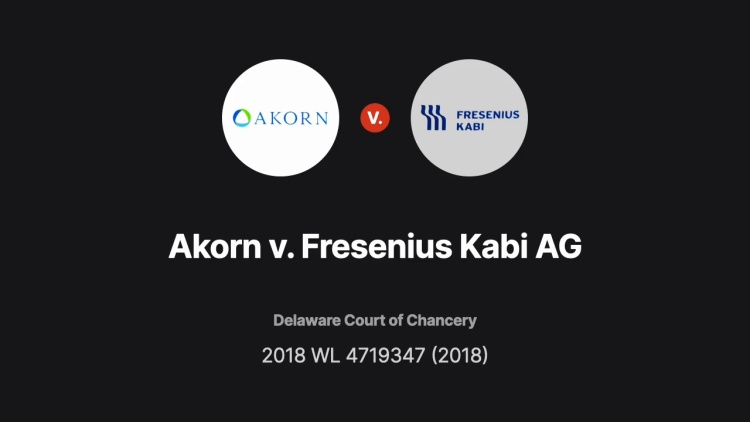Akorn, Inc. v. Fresenius Kabi AG
Delaware Court of Chancery
2018 WL 4719347 (2018)
- Written by Matthew Celestin, JD
Facts
In April 2017, Fresenius Kabi AG (Fresenius) (defendant), a pharmaceutical-drug manufacturer, agreed to acquire Akorn, Incorporated (plaintiff), another drug manufacturer. Under the agreement, Fresenius could terminate the deal if Akorn materially misrepresented its regulatory compliance to an extent that the misrepresentations would be reasonably expected to result in a material adverse effect (MAE) or if Akorn in fact suffered an MAE that could not be corrected before the closing date. Shortly after the parties executed the merger agreement, Akorn’s performance plummeted due to unexpected competition in the pharmaceutical market and Akorn’s loss of an important contract. Akorn’s performance continued to decline over the subsequent quarters. Fresenius also discovered major problems with the reliability of Akorn’s data and Akorn’s regulatory compliance, which revealed that Akorn misrepresented its regulatory compliance with Federal Food and Drug Administration (FDA) regulations. In April 2018, Fresenius notified Akorn that it was terminating the merger agreement, asserting that Akorn’s misrepresentations were reasonably expected to result in a regulatory MAE and that Akorn in fact suffered an MAE. Akorn filed suit, claiming that Fresenius’s termination was invalid. Akorn sought specific performance to compel Fresenius to close the deal.
Rule of Law
Issue
Holding and Reasoning (Laster, J.)
What to do next…
Here's why 907,000 law students have relied on our case briefs:
- Written by law professors and practitioners, not other law students. 47,100 briefs, keyed to 996 casebooks. Top-notch customer support.
- The right amount of information, includes the facts, issues, rule of law, holding and reasoning, and any concurrences and dissents.
- Access in your classes, works on your mobile and tablet. Massive library of related video lessons and high quality multiple-choice questions.
- Easy to use, uniform format for every case brief. Written in plain English, not in legalese. Our briefs summarize and simplify; they don’t just repeat the court’s language.





